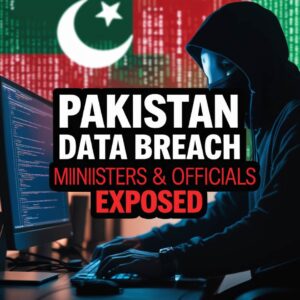Introduction: Why SIM Safety Matters in Pakistan
Your SIM card is more than just a tiny chip inside your phone. In Pakistan, it acts as your digital identity — connected to your CNIC, bank accounts, social media, and mobile wallets. A stolen or misused SIM can open the door to identity theft, financial fraud, and privacy violations.
Unfortunately, SIM misuse has become alarmingly common. Reports suggest that millions of SIM records have been leaked or sold online in recent years. From ordinary citizens to government officials, no one is safe.
But the good news is: you can protect yourself if you know the risks and take preventive measures.
1. Unauthorized SIM Registrations Under Your CNIC
One of the biggest risks in Pakistan is that fraudsters often register SIM cards using someone else’s CNIC without their knowledge. These illegally issued SIMs can then be used for:
- Criminal activities
- Scams and frauds
- Money laundering
👉 In many cases, innocent people have faced police inquiries or legal trouble because a SIM registered under their CNIC was misused.
How to Protect Yourself:
- Regularly check how many SIMs are registered against your CNIC via PTA’s SIM Information System (send CNIC number to 668).
- Immediately block any unauthorized SIMs linked to your ID.
2. SIM Swap Fraud and Banking Scams
SIM swap attacks are on the rise in Pakistan. Criminals trick telecom operators into issuing a duplicate SIM card in your name. Once they control your SIM, they can:
- Intercept bank OTPs (One-Time Passwords)
- Access mobile wallets like Easypaisa or JazzCash
- Take over your social media accounts
- Reset passwords for your email and apps
These scams have caused millions of rupees in losses for Pakistani users.
How to Protect Yourself:
- Never share your CNIC or SIM details with strangers.
- Use two-factor authentication (2FA) with authenticator apps instead of SMS-based OTPs.
- Set up PIN codes for SIM replacement requests with your telecom provider.
3. SIM Data Leaks and Online Sales
Recent media reports revealed that SIM owners’ personal data — including addresses, call logs, and CNIC copies — has been sold online for as little as Rs500–Rs5,000.
Such leaks can lead to:
- Stalking or harassment
- Targeted scams
- Identity theft
- Blackmail attempts
How to Protect Yourself:
- Be careful about where you share your phone number.
- Avoid submitting your SIM-linked number to unverified apps and websites.
- Regularly update your privacy settings on social media to hide your number.
4. Misuse of SIM for Terrorism or Cybercrime
In extreme cases, stolen or illegally registered SIMs have been used in terror-related activities or organized cybercrime rings. This not only puts individuals at risk but also has serious national security implications.
How to Protect Yourself:
- Always buy SIMs from authorized franchisees and verify the biometric process.
- Report any suspicious SIM activity immediately to your telecom operator and PTA.
5. Negligence in SIM Disposal and Recycling
Many Pakistanis throw away or sell old SIM cards without realizing that data can still be extracted from them. If your old SIM is misused, you could be legally or financially harmed.
How to Protect Yourself:
- Always formally block your old SIM before disposing of it.
- If you sell your phone, ensure the SIM and all linked data are completely erased.
Rising Threat: SIM Misuse in Numbers
- Over 180 million Pakistani users’ credentials were reported leaked globally in 2024.
- In some breaches, SIM location details were sold for just Rs500.
- Around 2.7 million CNIC records were compromised between 2019–2023.
These numbers paint a scary picture of how widespread the problem has become.
Role of Pakistani Authorities
The Pakistan Telecommunication Authority (PTA) and National Cyber Crimes Investigation Agency (NCCIA) are responsible for ensuring SIM card safety. While efforts have been made — such as biometric SIM verification — data leaks continue to surface, raising questions about enforcement.
Experts argue that tougher penalties for telecom negligence and stronger data protection laws are urgently needed.
Global Lessons Pakistan Can Learn
- India: Introduced stricter KYC rules for SIM issuance.
- EU (GDPR): Telecoms face heavy fines for data mishandling.
- US: Mobile carriers are investing in AI fraud detection to block SIM swap attempts.
Pakistan must adapt similar frameworks to close the loopholes in its telecom and cybersecurity systems.
Practical Tips for SIM Safety in Pakistan
Here are 10 golden rules every Pakistani should follow to protect their SIM card:
- Verify SIM count against your CNIC regularly (SMS CNIC to 668).
- Never share OTPs with anyone, not even “bank staff” or “PTA officials.”
- Enable two-factor authentication (2FA) using apps instead of SMS.
- Report lost/stolen SIMs immediately to your operator.
- Use strong passwords for online accounts linked to your number.
- Update your CNIC-linked information if you change your number.
- Check bank/mobile wallet transaction alerts frequently.
- Don’t store sensitive PINs/passwords in your phone’s messages.
- Buy SIMs only from authorized centers and complete biometric verification.
- Dispose of old SIMs safely by blocking and breaking them physically.
Conclusion: SIM Safety Is National Safety
In Pakistan, where your SIM card is tied directly to your CNIC, SIM security is not optional — it’s a matter of survival. From financial losses to identity theft and national security threats, the risks are real and rising.
But awareness is your best defense. By taking simple steps — from checking unauthorized SIMs to enabling 2FA — you can close the door on fraudsters.
The responsibility lies both with citizens and authorities. Unless telecom companies and regulators enforce stricter protections, Pakistan will continue to face one SIM scandal after another.




Leave a Reply